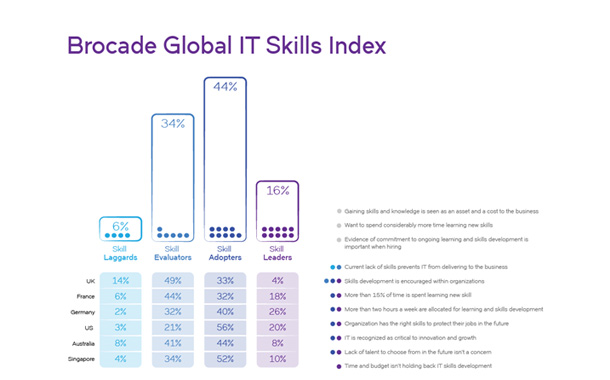Brocade Global Study Reveals More Than Half of IT Teams Will Struggle in Next 12 Months; In Asia Pacific, IT leaders in Australia view Artificial Intelligence (AI) as the most critical skill, while those in Singapore value training and allocate more time for learning and skills development per week
Brocade announced a new Global Digital Transformation Skills Study, which aims to uncover how well-placed global IT leaders consider themselves and their teams to be in terms of meeting current and future business demands. Of the six markets surveyed, Germany was found to be the best prepared to meet its digital transformation goals, closely followed by the U.S., while the UK lagged well behind its counterparts.
Overall, an encouraging 91 percent of global IT leaders acknowledge that IT departments are currently recognized as very important or critical to innovation and business growth. However, over half (54 percent) predict they will struggle with a lack of IT talent in 12 months. Contributing factors identified from the research include skills shortages, prevalence of outdated skills, lack of commitment to training at the corporate board level, and the rapidly changing technology environment.
“Businesses are approaching the peak of IT strategic influence. Now is the moment that IT teams feel they have the strongest opportunity to influence the transformation of their organizations,” said George Chacko, Principal Systems Engineer & Lead Technical Consultant, Brocade India. “However, with a rapidly changing technology landscape and potential impact on international labor markets, it is critical that IT receives the right training to further develop their skills and business relevance.”
The research also found that skills planning had to be aligned with other areas of business planning to avoid the risk of a technology skills deficit, where IT teams are expected to deliver the benefits of technologies that they are ill-equipped to implement.
Organizations are attempting to move their IT departments away from their traditional roles, but the lack of skills and the time required to learn those skills have held them back. IT decision makers (ITDM) believe this could be a major contributor to their inability to meet business demands, putting organizations at risk of falling behind their competitors and losing customers.
Approximately one in four respondents in Australia, France, Germany, Singapore, and the U.S. claim that they cannot deliver on current business demand due to staff shortages. This number rises to 42 percent in the UK. Respondents claim that the lack of access to talent will prevent them from implementing new technologies efficiently, lead to a decrease in employee satisfaction, and result in the loss of market share.
Despite respondents claiming that they plan approximately two years in advance for most areas of the business, staffing and recruitment is still on average only planned for a maximum of a year. This is creating a disconnect where organizations are attempting to address key IT challenges with teams not as well equipped in terms of skills and experience as they could be.




